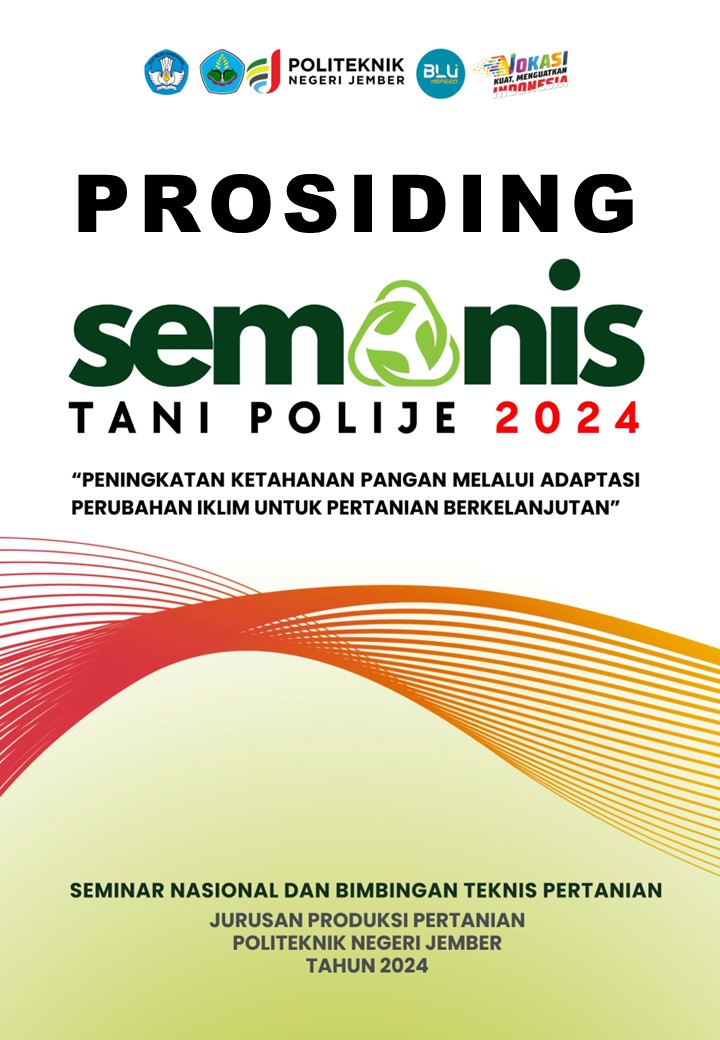Pembentukan Kalus pada Eksplan Daun Kopi Robusta dan Arabika pada Beberapa Konsentrasi Media MS (Murashige and Skoog)
DOI:
https://doi.org/10.25047/agropross.2024.775Kata Kunci:
Kalus, Kopi, Media 1/2 MSAbstrak
Penelitian ini bertujuan untuk mengujikan beberapa konsentrasi media Murashige and Skoog (MS) (MS Full, ¼ MS, dan ½ MS) terhadap pembentukan dan pertumbuhan kalus dari daun muda kopi Robusta dan Arabika. Penelitian yang dilaksanakan di Laboratorium Kultur Jaringan Tanaman, Politeknik Negeri Jember selama 2 bulan, dirancang menggunakan metode Rancangan Acak Lengkap (RAL) Faktorial. Faktor pertama adalah jenis kopi (Robusta dan Arabika) dan faktor kedua adalah konsentrasi media MS (MS Full, ¼ dan ½ Konsentrasi). Setiap perlakuan ditambahkan 1 ppm 2,4-D dan 1 ppm Kinetin. Berdasarkan hasil penelitian ini dapat disimpulkan bahwa perbedaan konsentrasi media MS berpengaruh sangat nyata pada paramater persentase eksplan membentuk kalus dan berat segar kalus, namun berbeda tidak nyata pada hari kemunculan kalus, karena rata-rata kemunculan kalus pada 10 s/d14 HST. Sedangkan jenis kopi Arabika dan Robusta tidak memberikan perbedaan yang nyata pada semua parameter. Media ½ MS memiliki persentase pembentukan kalus paling besar yaitu sebesar 91,7%, dengan berat rata-rata 1.082 gr. Selain itu, kalus yang terbentuk pada media ½ MS bertekstur remah dan bernodul serta berwarna putih kekuningan dan putih kecoklatan. Maka, dalam penelitian ini konsentrasi media yang berpotensi sebagai media dasar dalam pembentukan kalus kopi robusta dan arabika yaitu media ½ MS.
Unduhan
Referensi
Abd El Gawad, N., Mahdy, H. A., & Boshra, E. S. (2012). In vitro micropropagation protocol and acclimatization of coffee trees (Coffea arabica L.). Journal of Plant Production, 3(1), 109–116.
Asmono, S. L., Wardana, R., & Rahmawati. (2022). Optimization of the sterilization method for leaf explant Robusta BP 308 coffee in vitro. IOP Conference Series: Earth and Environmental Science, 980(1), 012001. https://doi.org/10.1088/1755-1315/980/1/012001
Avila-Victor, C. M., Ordaz-Chaparro, V. M., Arjona-Suárez, E. de J., Iracheta-Donjuan, L., Gómez-Merino, F. C., & Robledo-Paz, A. (2023). In Vitro Mass Propagation of Coffee Plants (Coffea arabica L. var. Colombia) through Indirect Somatic Embryogenesis. Plants (Basel, Switzerland), 12(6). https://doi.org/10.3390/plants12061237
Badan Pusat Statistik Indonesia. (2024). Statistical Yearbook of Indonesia 2024.
Buiteveld, J., Fransz, P. F., & Creemers-Molenaar, J. (1994). Induction and characterization of embryonic callus types for the initiation of suspension cultures of leek (Allium ampeloprasum L.). Plant Science, 100(2), 195–202.
Dewi Ibrahim, M. S., Sudarsono, S., Rubiyo, R., & Syafaruddin, S. (2012). Pengaruh Komposisi Media terhadap Pembentukan Kalus Embriogenesis Somatik Kopi Arabika (Coffea arabica). Journal of Industrial and Beverage Crops, 3(1), 13–22.
Ducos, J.-P., Lambot, C., & Pétiard, V. (2007). Bioreactors for coffee mass propagation by somatic embryogenesis. International Journal of Plant Developmental Biology, 1(1), 1–12.
Elkonin, L. A., & Pakhomova, N. V. (2000). Influence of nitrogen and phosphorus on induction embryogenic callus of sorghum. Plant Cell, Tissue and Organ Culture, 61, 115–123.
Groll, J., Mycock, D. J., & Gray, V. M. (2002). Effect of medium salt concentration on differentiation and maturation of somatic embryos of cassava (Manihot esculenta Crantz). Annals of Botany, 89(5), 645–648.
Han, M., Gleave, A. P., & Wang, T. (2010). Efficient transformation of Actinidia arguta by reducing the strength of basal salts in the medium to alleviate callus browning. Plant Biotechnology Reports, 4, 129–138.
Hapsoro, D. W. I., Hamiranti, R., &Yusnita, Y. (2020). In vitro somatic embryogenesis of superior clones of robusta coffee from Lampung, Indonesia: Effect of genotypes and callus induction media. Biodiversitas Journal of Biological Diversity, 21(8), 3811.
He, Y., Guo, X., Lu, R., Niu, B., Pasapula, V., Hou, P., Cai, F., Xu, Y., & Chen, F. (2009). Changes in morphology and biochemical indices in browning callus derived from Jatropha curcas hypocotyls. Plant Cell, Tissue and Organ Culture (PCTOC), 98(1), 11–17. https://doi.org/10.1007/s11240-009-9533-y
Ibrahim, M. S. D., Hartati, R. S., Rubiyo, R., Purwito, A., & Sudarsono, S. (2013). Induksi kalus embriogenik dan daya regenerasi kopi arabika menggunakan 2, 4-Dichlorophenoxyacetic Acid dan 6-Benzyladenine. Jurnal Tanaman Industri Dan Penyegar, 4(2), 91–98.
Rizwan, H. M., Irshad, M., He, B., Liu, S., Lu, X., Sun, Y., & Qiu, D. (2020). Role of reduced nitrogen for induction of embryogenic callus induction and regeneration of plantlets in Abelmoschus esculentus L. South African Journal of Botany, 130, 300–307. https://doi.org/https://doi.org/10.1016/j.sajb.2020.01.016
Utsumi, Y., Utsumi, C., Tanaka, M., Ha, V. T., Matsui, A., Takahashi, S., & Seki, M. (2017). Formation of friable embryogenic callus in cassava is enhanced under conditions of reduced nitrate, potassium and phosphate. PLoS One, 12(8), e0180736.
van Boxtel, J., & Berthouly, M. (1996). High frequency somatic embryogenesis from coffee leaves. Plant Cell, Tissue and Organ Culture, 44(1), 7–17. https://doi.org/10.1007/BF00045907
Verma, S. K., Das, A. K., Cingoz, G. S., Uslu, E., & Gurel, E. (2016). Influence of nutrient media on callus induction, somatic embryogenesis and plant regeneration in selected Turkish crocus species. Biotechnology Reports, 10, 66–74. https://doi.org/https://doi.org/10.1016/j.btre.2016.03.006
Workia Ahmed, T. F., & Disasa, T. (2013). Somatic embryogenesis of a coffee (Coffea arabica L.) hybrid using leaf explants. The Journal of Horticultural Science and Biotechnology, 88(4), 469–475. https://doi.org/10.1080/14620316.2013.11512993
Unduhan
Diterbitkan
Cara Mengutip
Terbitan
Bagian
Lisensi
Hak Cipta (c) 2024 Sepdian Luri Asmono, Rahmawati Rahmawati, Hazaratul Husna, Anis Sulala, Shefy Auliya, Eko Hadi Cahyono

Artikel ini berlisensi Creative Commons Attribution 4.0 International License.
Hak cipta (Copyright) artikel yang dipublikasikan di Agropross : National Conference Proceedings of Agriculture dipegang oleh penulis (Copyright by Authors) di bawah Creative Commons Attribution 4.0 International License (CC-BY). Sehingga penulis tidak memerlukan perjanjian pengalihan hak cipta yang harus diserahkan kepada redaksi.







